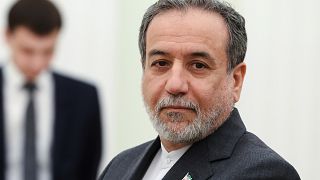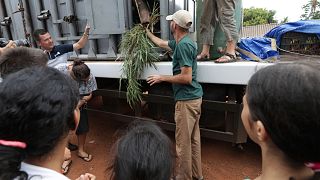Gaza City
At the Kerem Shalom crossing between Israel and the Gaza Strip, as far as the eye can see, humanitarian trucks wait patiently to be checked before sending their cargoes of aid to the besieged Palestinian territory threatened with famine.
Under the watchful eye of the Israeli army, which organized a visit for the press, journalists were allowed access on Friday to this entry point, which was exceptionally open to allow the delivery of humanitarian aid.
One by one, Egyptian truck drivers enter a vast parking lot to have their goods checked.
Behind them, Egypt, with its nearby border, and immense barbed-wire walls. They have waited for hours before being able to enter a slot in the immense Israeli separation barrier.
"I'm proud to bring aid to my Palestinian brothers", says Saïd Abdel Hamid, as he removes the tarpaulin from his cargo of flour so that it can be inspected by Israeli soldiers. His license plate and identity are carefully recorded, and the driver also answers a few questions.
Mohamed Ali, another driver coming from Cairo with a stock of cookies, confides that "the Egyptian secret services have given instructions to speak as little as possible".
Mattresses, blankets and foodstuffs overflow from the trailers of trucks emblazoned with the Egyptian Red Crescent symbol. A sniffer dog, accompanied by heavily armed soldiers, randomly inspects the goods.
On average, 80 trucks a day enter Gaza via the Kerem Shalom border crossing, according to the Israeli army. This new supply route was opened last week to relieve congestion at the Rafah crossing between Egypt and Gaza, just two kilometers further north.
On December 12, Israel announced an additional inspection point at Kerem Shalom for humanitarian aid, which is then sent back to Rafah, before "temporarily" authorizing the unloading of certain trucks directly on the Gaza side of the crossing three days later.
UN organizations continue to warn, however, that humanitarian aid is woefully inadequate for this overpopulated territory of 362 square kilometers, where Israeli bombardments have destroyed entire neighborhoods and displaced 1.9 million people, i.e. 85% of the population.
''Acute malnutrition"
Around half the population in Gaza is expected to be in the "emergency" phase - which includes very high acute malnutrition and excess mortality - by February 7, according to a report by the UN hunger monitoring system.
With "such deprivation and destruction, each passing day will only bring more hunger, disease and despair to the people of Gaza", warned UN humanitarian chief Martin Griffiths.
On Friday, the Security Council passed a resolution calling for the "large-scale" and "urgent" delivery of humanitarian aid to Gaza, without calling for a ceasefire.
It was from this territory, which has been under an Israeli blockade for over 16 years, that Hamas launched its attack on Israeli soil on October 7, killing around 1,140 people, most of them civilians, according to an AFP count based on the Israeli death toll. Palestinian commandos also kidnapped around 250 people, 129 of whom are still being held in Gaza, according to the Israeli authorities.
In retaliation, Israel has vowed to destroy the Islamist movement and is relentlessly pounding Gaza, where at least 20,057 people, mostly women and children, have been killed and more than 50,000 wounded, according to the latest figures from the Hamas government, which took power in the territory in 2007.
"More than 2,500 truckloads of humanitarian aid and over 50,000 tons of food have entered Gaza since the start of the war," said Colonel Moshe Tetro, head of the Israeli Defense Ministry's body overseeing civilian activities in the Palestinian Territories (Cogat), present at the Kerem Shalom crossing.
On Thursday, an Israeli strike on the Palestinian side of the crossing, called Karem Abou Salem in Arabic, had left four people dead, including its director Bassem Ghaben, according to Hamas.
"Soldiers saw weapons on the Kerem Shalom border," reacted Colonel Tetro, without giving further details.
In the meantime, Egyptian truck drivers are wandering around the parking lot, killing time to the sound of music as they wait for permission to bring supplies to the Palestinians in the Gaza Strip.











Go to video
Gaza’s scarcity of cash fuels desperation, sparks unusual trade
01:09
Israel bombs Houthi targets in Yemen, rebels respond with missile attack
01:00
Hamas gives 'positive' response to 60-day ceasefire proposal but says talks needed on implementation
01:55
US contractors say colleagues fired live ammunition at Palestinians seeking food
01:30
Foreign Ministers of Oman and Egypt urge Washington and Tehran to resume negotiations
01:04
Israeli airstrike on popular Gaza City beach café kills at least 30